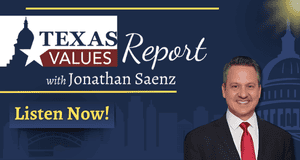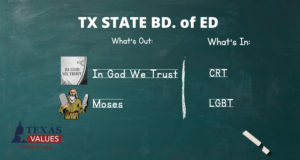Action Alert: Moses & “In God We Trust” ‘Out;’ LGBT, CRT ‘In’ for New TX School Standards
Action Alert: Moses & “In God We Trust” ‘Out;’ LGBT, CRT ‘In’ for New TX School Standards
The elected Texas State Board of Education (SBOE) will meet on August 1, for a special meeting to discuss Social Studies & History standards and effectively what will be taught to all K-12 students in Texas public schools. The SBOE is made up of 15 individuals who are elected by Texas voters and their normal role is to, every 8-10 years, review school subject areas to decide if any changes needed to be made.
However, before the SBOE approves these teaching standards, unelected “workgroup members” make recommendations of what should stay “in” and what should be taken “out.” What is taught in History and Social Studies in Texas has historically been a huge topic of debate because many people want ban, censor and remove references to our Christian heritage as a country, and focus less on current and historical heroes and people who share such values.
Recently, these “workgroup members” have recommended that Moses (as a well-established historical connection to law American law and policy) and teaching about our National Motto “In God We Trust” be removed from our current Texas classroom teaching, while LGBT and leftist ideology and political opinions, including Critical Race Theory (CRT), are added to the Social Studies & History standards. If we don’t do something, these radical standards will stay!! Why? Because often and sadly, in our nearly 20 years of experience, some of our elected SBOE members follow (or they fail to completely read) the workgroup members recommendations, and once the “workgroup members” make recommendations, SBOE members face major media and liberal pressure to accept them. But wait, there’s more. There is a long list of bad recommendations made by these workgroups that must be corrected and they only way that happens is if you tell SBOE members to make these changes.
You can do something about this. We need as many parents and Texans as possible to:
- Come to Austin (the best option) and testify against some of the radical proposals and encourage the board to teach well rounded history to our K-12 students, (REGISTRATION OPENS TOMORROW-DETAILS BELOW) or
- Email and call (also helpful and important too) your elected SBOE member. The board will meet to discuss an updated draft of the high school standards that were discussed in June. Additionally, TEA has published the Social Studies standards for students in grades Kindergarten through 7th grade that will be discussed at the SBOE meeting for the first time.
There are many concerns with the Social Studies standards that delete Christian and conservative references while mentioning LGBT and leftist ideologies.
- Moses has been removed from the standards, again.
- The Religious Freedom Clauses of the First Amendment of the U. S. Constitution
- The requirement to learn the national motto “In God We Trust” in U.S. History class has been removed.
- Students will be required to define sexual orientation.
- 8th Grade students will be required to study the Gay Pride movement.
- Students will be taught that the Texas Rangers are “an instrument of oppression”.
- Ethnic Studies which include concepts of “intersectionality,” LGBT rights, Critical Race Theory (CRT), and describes border security as the “militarization of the U.S. Mexico border.”
Registration for in person testimony begins July 28, at 8a.m. and closes July 29, at 5p.m. You can sign up here. You can also submit comments regarding the standards to the SBOE by emailing teks@tea.texas.gov.
To contact our Texas Values office with questions about registering to testify or contacting the board, please email us at info@txavlues.org.
The drafts for the high school Social Studies standards are available here.
The drafts for K- 8 standards are available here.
To see the new Ethnic Studies Courses see.
Below you can find specific concerns with the current draft of the TEKS with their subject and page numbers.
High School TEKS, Workgroup C July 2022 Document
- U.S Historyà p. 2 Deleted TEK with “In God We Trust” 1 (C) à explain the meaning and historical significance of the mottos “E Plubirus Unum and In God We Trust”
- U.S History à p. 20 TEK 17 (G) will have kids learn about abortion in context of “analyze the debate between liberalism and conservatism including the diverse perspectives of … abortion”
- U.S History 15 (B) p. 18 Compare roles, goals, and accomplishments of organizations ins supporting social movements … GLAAD (Gay and Lesbian Alliance Against Defamation)
- World Geography p. 32 à TEK 7 (B) Gender Inequality Index
- World Geography p. 35 -> TEK 10 (A) Ethnic Sovereignty
- U.S Government -> TEK 1 (B) -> changed for the better to add Judeo Christian legal tradition and the Ten Commandments, but struck biblical law
- U.S. Government p. 81 13 (A) -> deleting TEK on citizenship and instead talk about active listening
- U.S Government p. 91 13 (B) -> struck Establishment clause
- U.S. Government p. 96 16 K -> struck Civil Rights Act of 1964 and put in TEKS guide
- U.S. Government p. 99 struck standard with Moses, William Blackstone, John Locke, and Charles de Montesquieu
- U.S Government p. 100 struck standard with George Washington, Thomas Jefferson, John Marshall, Andrew Jackson, Abraham Lincoln, Theodore Roosevelt, FDR, and Ronald Reagan
- U.S. Government p. 100 struck standard where learn the importance of a written Constitution
- U.S. Government p. 100 struck standard that serves the purpose set forth in the Preamble to the Constitution
- U.S Government p. 101 struck standard that talks about limited government, separation of powers
- U.S. Government p. 102 struck standard about the Constitution limiting the power of national and state governments
- U.S. Government p. 102 struck standard on how good citizenship sometimes requires sacrifice
- Sociology p. 113 added TEK 5(H) “define sex, gender, and sexual orientation and differentiate among their distinguishing characteristics”
- Sociology p. 116 struck TEK 8 (A) “identify the stages of adult development and compare the difference between male and female development”
- Sociology p. 117 struck TEKS 13 A-D
- Social institutions. The student identifies the basic social institution of the family and explains its influences on society. The student is expected to:
- Define the functions and rituals of the family and how the family has changes over time
- Define family systems and patterns
- Analyze the trends in American society regarding family life and the needs that the institution of family satisfies and
- Analyze ways in which family life can be disrupted
- Sociology p. 118 struck TEK 15 ( D) analyze the function … religion serves in society
- Sociology p. 118 struck TEK 15 (E) compare and contrast distinctive features of religion in U.S. with that of other countries
Kindergarten- 8th Grade Standards Workgroup D Document
- Grade 4 p. 28 TEK 2 (B) add describe ideas central to Judaism including monotheism and Ten Commandments as moral and legal code ( TEK does not include Christianity in discussing the Ten Commandments and monotheism)
- Grade 5 TEKS guide p. 44 Lack of definition for Crusades and pilgrims
- Grade 7 TEK 2 (A) p. 64 Locke and Montesquieu are mentioned but so is Haudenosaunee Confederacy as influence on writing of Constitution
- Grade 8 TEK 7 (C) p. 84 explain clash between Mexican Americans and immigrants with Texas Rangers -> TEKS guide says Texas Rangers were used as an instrument of oppression
- Grade 8 TEK 12 ( G) p. 89 compare the goals of Pride … and explain how individuals identified with and participated in multiple movements
Additions to the TEKS that are good
- Kindergarten p. 5 add TEK (M) add “define patriotism and identify the United States flag….
- Grade 4 p. 31 TEK 7 (A) talk about central ideas of Christianity
- TEK (B) & (C )also talk about Christianity
- Grade 6 TEK 6 (F) p. 57 First Great Awakening and religious freedom
- Grade 6 TEK 6 (K) p. 57 expand religious and political freedom
- Grade 6 TEK 4 (B) p. 55 explain the different religious motivations of English, French, and Spanish


